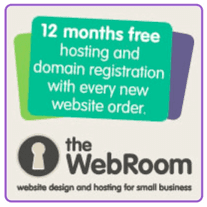Setting up a new business is hard work and takes hours of thought, planning and careful consideration as to how you are going to make it all happen (and make some money).
There’s finances to deal with, business models to consider, a brand look and feel, a name… the list is seemingly endless.
And part of that list is the online component, especially if your new business is going to be trading online in any capacity.
Where do you begin once you’ve decided you want to promote your business online? It’s a jungle out there and the information overload just ends up becoming confusing and superfluous. Especially when it comes to IT.
Being informed up front can save a lot of redevelopment time and money in the long run and gives you a clear idea of how your website can grow with your business.
Here is a list of helpful points that you should think about and research before diving into the world wide web.
What’s a Domain Name?
This will be your URL (your web address) and should be the first thing you do once you’ve decided to start promoting your business online.
In some ways this one of the most time-consuming processes because finding a name that is not taken is not always easy! If your business name is unique, or uses your own name, you probably won’t have any problems but if you want to use some of your search keywords in the URL it may be nearly impossible to find an available domain.
Buying a domain is not expensive and the longer you buy it for up-front the better it is for SEO.
You can own a domain without having a website live on it, this is called Domain Parking. It reserves your intended domain name so it will be available for future use.
When you purchase a domain you will be given a certificate verifying registration of the domain and it should be in your name and ABN.
If you want to register a domain ending in “.com.au” you must have an ABN.
What is Hosting?
In order to have your website live or email accounts, you will require someone to host it. There are a huge range of options available and the cost will always depend on the following requirements:
- How much physical server space your website will need
- How much traffic will be going through your site per month
- Whether you need an SSL certificate (for secure transactions online)
Most hosting providers include 5 or more email addresses and phone/email support. The good news is they will offer a range of plans designed to suit all types of business.
The cost of hosting differs greatly from provider to provider and it can become overwhelming trying to choose.
Finding the right plan can be a similar experience to finding a mobile phone plan. If you want your hosting to be stress-free consider choosing a provider who:
- Is based in Australia
- Offers efficient email and phone support
- Offers reliability
- Does not lock you in to a contract and allows you to upgrade, downgrade or cancel whenever you need to.
When choosing the right, it’s best to buy a bit more than you think you will need.
Quite often the cheapest plan is not right for a start-up website and before you know it, you’ll be needing to upgrade. It’s important to choose a business plan as it will allow for more space and bandwidth than a personal plan which really only gives you the capacity for emails.
Good customer service is important when dealing with a hosting provider – this is an area many people do not understand and you need to be able to ask some stupid questions without feeling foolish!
A hosting company with good support will be easier to deal with than a cheap overseas-based provider that won’t return your emails.
And what about ecommerce?
This section is for all of you budding e-tailers who are wanting to be able to sell your products online as part of your website.
Setting up your online store is the hardest part of getting on-line and not for the faint hearted. If your business is selling products online it is important that transactions can be made in a fast and secure manner.
This section necessitates a whole article of it’s own but the basic points to look into are:
- How and when are your customers going to pay for the goods
- How quickly are you going to deliver their purchases after they have paid
- You need to link up the website to your bank account so the money can be electronically transferred
In order to facilitate this you need two things;
- An Internet Payment Gateway, which you organise through a third party provider and;
- An Internet Merchant Facility (IMF), which you organise through your bank.
Some trusted payment gateways are eWay, SecurePay and BPay.
These facilities provide a link from your checkout to your bank account, usually in real time. They all charge fees for their services and eWay will actually help you organise setting up your Internet Merchant Facility with the bank.
Check with your bank because some of them offer Internet Payment Gateway services as well.
Other payment options that don’t require an Internet Merchant Facility are:
- Bank Direct Deposit: Customers are able to transfer money from their own bank account to yours.
- PayPal: This trusted provider allows transactions to be processed quickly and securely from one PayPal linked bank account to another. Your customers must have a PayPal account to use this facility and there is a fee to use it.
When getting your bank on board with an Internet Merchant Facility, they will want your website to state clearly your privacy policy, a returns policy on your goods and a promised delivery time once the payment is cleared. So, it’s important your website is written before applying for an IMF.
The costs of a payment gateway and internet merchant facility are ongoing for the life of your website and should be factored in to your start-up budget and ongoing running costs.
Website design and development
This is another area that can be delved into with more detail than this article allows (I’ll publish a full article as part of this series). There are loads of options as to what kind of website you can or should use!
Things to consider before you even begin are:
- How much are you prepared to spend?
- How functional is your website going to be?
- Do you want to be specific about the design and your brand representation?
- If your business grows will you need a bigger and better website that has extra functionality?
- Do you want to maintain the site yourself?
- Do you need an eCommerce solution?
There are a few different options available to you, with different price tags:
$$$ – Bespoke or custom design service.
Recommended for online stores or websites that require a specific identity.
This is the most expensive option but you will get exactly what you want. This option involves consultation with a designer who will develop a website that meets all of your needs and looks exactly how you want it to look. They will also give you advice on branding, functionality and SEO. This is a good option if you are thinking long-term because you can have the website designed and built so it can grow with your business for minimal cost down the track.
$$ – Recommended for small business’ who don’t have a specific look and feel and just want a space on the internet.
An internet search will bring up literally tens of thousands of options for cheap websites. Lots of companies offer very affordable websites, which consist of them buying a template, plugging it in and adding your content to the site.
If it’s not important what your site looks like and you don’t want to make any changes to the design then it is worth considering. It is important to know exactly how much development you will get for your money and how much it will cost if you want extra time spent. This option may end up costing more in extras than a custom service and may not accommodate your business’ changing needs.
$ – Ideal for start-up blogs and forums
Start off with free open source platforms such as WordPress, PHP BB or Joomla to get your website up and running before committing to a custom designed site.
These platforms, especially WordPress and Joomla have loads of templates (some are free) that you can use to start off with. All designers can pick up one of these sites and make changes if you decide to customise the site later on down the track.
The down-side is, you have to do all of the work yourself and some open source platforms are difficult to work out if you have no coding knowledge. The support is mostly via forums, so you need to search the internet to get help. But it’s free and you will soon find out whether it’s the right option for you.
Above all, shop around and don’t get locked in.
When you are ready to get online, do your homework. Get quotes from a number of companies that interest you.
Consider the following;
• Make a list of every requirement you have and communicate that list when requesting a quote. That can reduce hidden costs when it comes time to pay.
• Check out exactly what you are going to get for the initial price. If their website does not tell you, ask.
• Ask what is considered an extra and how much will it cost you over and above the initial development fee.
• Whether you want a hosting package included with your website. If you don’t, you will need to organise your own hosting and domain registration.
• If you want someone to completely manage your site for you, what is the ongoing price?
• If you like having good customer service and a relationship with your designer/developer, use a smaller, more personalised company or a sole trader. A good designer/developer with work with you to understand your business and you can be guaranteed of getting exactly what you want. It’s not the cheapest option, but it can be the most satisfactory for people who appreciate special service and a familiar voice when they need help.
• Avoid anything that locks you in to a contract or costs you money to get out of. There are plenty of design and hosting options available that give you the freedom to upgrade, downgrade or move on for absolutely no extra cost. Choose one of those and if you are happy with their service you can build a relationship that takes the stress out of maintaining your website.
 This post was written by Danni Sweeting … a mum, graphic designer and owner of The Web Room, a website design and hosting company that specialises in taking the fuss out of getting small businesses online.
This post was written by Danni Sweeting … a mum, graphic designer and owner of The Web Room, a website design and hosting company that specialises in taking the fuss out of getting small businesses online.




















9:37 am
4:48 am
12:42 am
11:54 pm
3:21 pm
7:57 pm
1:14 pm
9:31 pm
9:53 pm
8:52 pm
9:57 pm
11:20 pm
10:41 pm
7:58 pm
3:36 pm
10:01 pm
4:43 pm
9:30 pm
5:34 pm
1:44 am
- 1
- 2
- …
- 5
- »
Post a commentTo post a review/comment please join us or login so we can allocate your points.